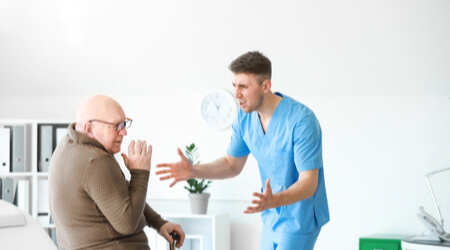
There are situations in which nursing home residents may be restrained to keep them from hurting themselves or others. But too often nursing home residents are improperly restrained as a means of controlling their behavior for the staff’s convenience or as a means of punishment.
Restraints used in nursing homes are usually physical (straps, belts, ties, vests, wheelchair bars or brakes, bedside rails or sheets tucked in too tightly). Restraints may also be chemical (sedatives, antipsychotics, anxiety-reducers and other drugs). A nursing home resident might also be locked in a room, subjected to electronic surveillance, direct physical force or psychological pressure to curb behaviors.
By federal law, nursing home residents have the right to be free from any physical or chemical restraints imposed for purposes of discipline or convenience – or that are otherwise not required to treat the resident’s medical symptoms.
If your loved one has been subjected to the wrongful use of restraints in a South Carolina nursing home, a Joye Law Firm attorney can help you. You may be eligible for compensation for pain and suffering, as well as for any medical care the wrongful treatment made necessary.
Call Joye Law Firm now or fill out our online contact form for a free and confidential review of your situation.
Wrongful Restraint is a Serious Problem in Nursing Homes
Restraints are used in nursing homes and similar settings to control residents whose behavior is disruptive, aggressive or dangerous. A resident with a history of falls, or who has developed mobility, cognitive or functional disabilities that require assistance may be wrongfully restrained for the convenience of the nursing home staff.
The Department of Health and Human Services’ National Quality Measures Clearinghouse (NQMC) says use of restraints can have many negative outcomes, such as:
- Strangulation
- Loss of muscle tone
- Decreased bone density (with greater susceptibility for fractures)
- Pressure sores (bedsores)
- Increased infections
- Decreased mobility
- Depression
- Agitation
- Loss of dignity
- Social isolation
- Incontinence
- Constipation
- Functional decline
- Abnormal changes in body chemistry and muscular function.
The use of physical restraints also often constitutes a disproportionate infringement of the autonomy of the resident, the NQMC says. In some cases, use of restraints may lead to a resident’s death.
The Nursing Home Reform Law outlines a series of basic rights for nursing home residents. Among them is the right “to be free from … physical and chemical restraints.”
Medical researchers and ethicists say that clinical interventions other than restraints are more effective in dealing with residents. These may range from positioning residents differently to increase their comfort, to changes in medication, or providing companionship and supervision or a program of safe activities to occupy and distract nursing home residents who are agitated or confused.
End Wrongful Use of Nursing Home Restraints
In addition to the injuries and medical problems the use of restraints may cause, signs that a nursing home resident is being restrained include:
- The presence of ties on bed frames or other restraining devices in the resident’s room.
- The presence of bed rails.
- Bruising on wrists, arms, ankles or legs.
- The resident’s rocking in a wheelchair as if to try to dislodge brakes or blocking.
- Unexplained grogginess, sleepiness, lack of focus, etc., which may indicate the effect of drugs.
Nursing homes should keep detailed records of the care they provide to their residents and the rationale for such care. This would include documentation of any medical necessity that supported the use of physical or chemical restraints.
If a nursing home resident is being restrained without a documentable medical necessity, his or her rights are being violated. If you suspect such abuse of a nursing home resident who is a loved one of yours, Joye Law Firm can help you. We can take steps to investigate the treatment of your loved one in the nursing home and get answers as well as corrective measures.
You may be able to obtain compensation for the pain and suffering your loved one has endured, for the costs of medical care they need because of the abuse and for their relocation to a new residence. More important, a nursing home abuse attorney can help to put an end to this treatment.
Contact Our South Carolina Nursing Home Abuse Attorneys
Improper use of physical or chemical restraints on a nursing home resident as punishment or for the nursing home staff’s convenience is unlawful. If it is happening to someone you care about at a nursing home or similar long-term care facility in South Carolina, Joye Law Firm can help you. The resident may be entitled to compensation for medical care, pain and suffering and other needs or losses due to this form of abuse.
Call Joye Law Firm or fill out our online contact form to set up a free and confidential discussion of your legal options today.
Sources:
- Journal of Medical Ethics – Use of physical restraint in nursing homes: clinical?ethical considerations
- National Quality Measures Clearinghouse – Long-stay nursing home care: percent of residents who were physically restrained
- National Long-Term Care Ombudsman Resource Center– Residents’ Rights

































